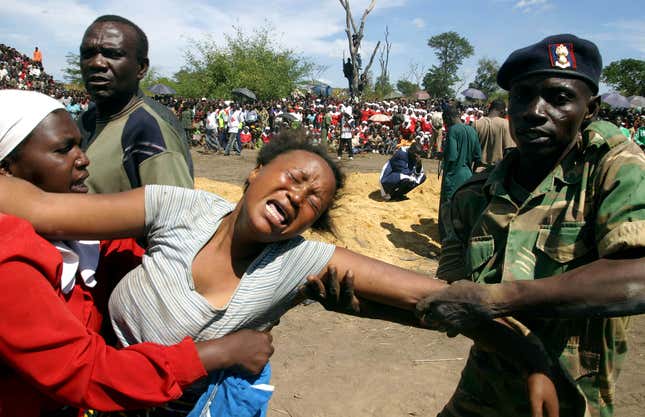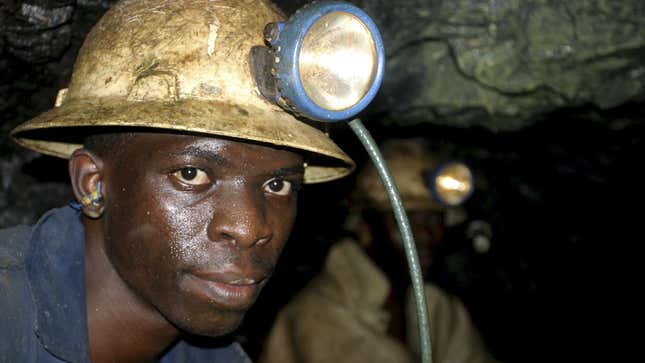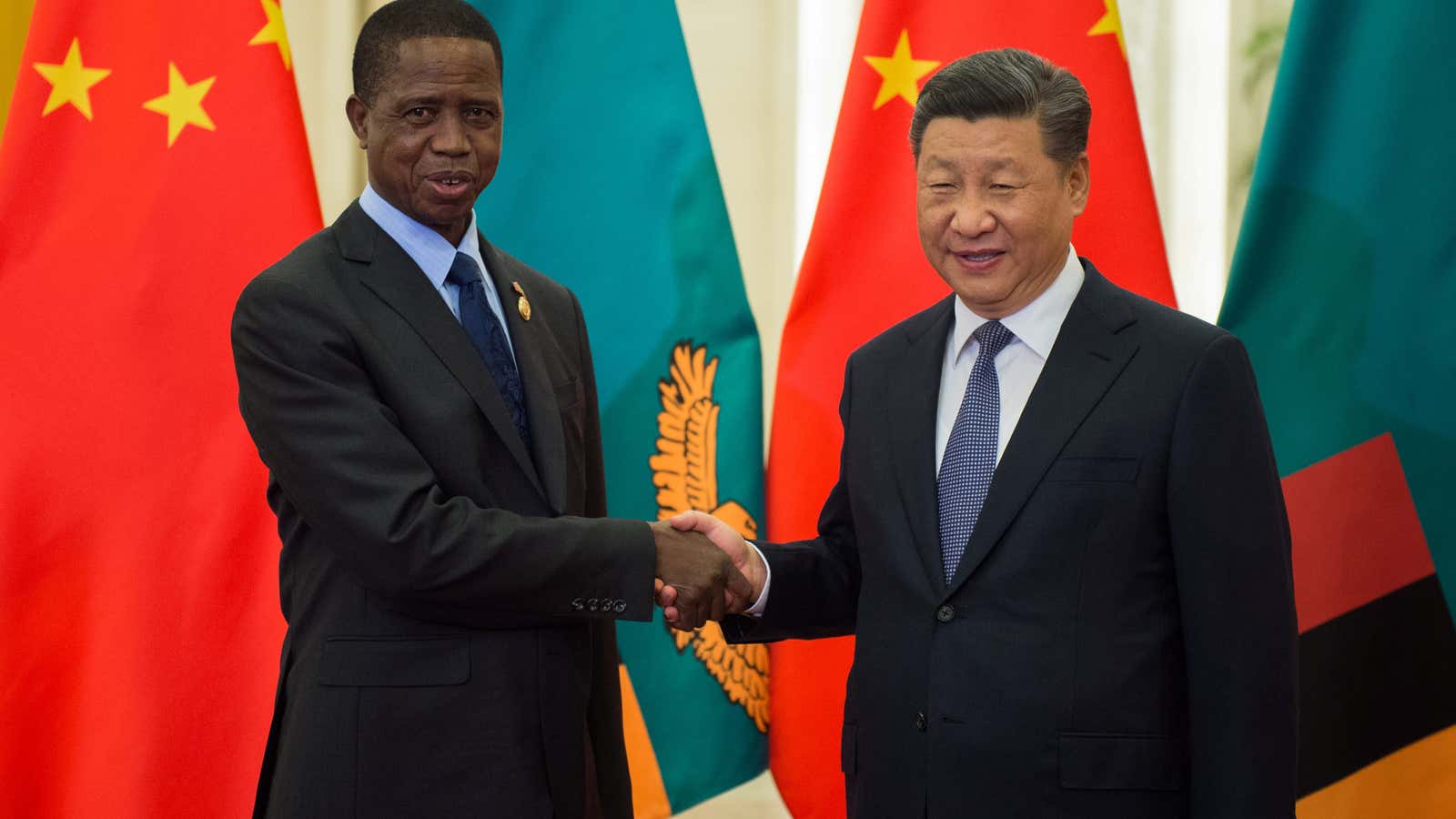In December 2017, when Zambian authorities recruited eight Chinese nationals into its police force, it predictably caused a stir locally and internationally. After a public uproar, the eight reservists were decommissioned.
The incident cast Zambia once again into the global spotlight for its relationship with China. For many analysts, this southern African country of 15 million people has become the ground zero for examining the relationship between the continent and its largest trading partner.
The relationship is nearly as old as post-colonial Zambia which gained independence in 1964. From the onset, China has been crucial as an alternative to the West. Landlocked and needing a connection to the coast that bypassed white-minority ruled neighbors, China helped to build and finance a 1,860-kilometer railway line between the port in Dar es Salaam, Tanzania and Kapiri Mposhi in central Zambia. When it was finished in the 1970s, it was China’s biggest infrastructure project internationally.
Zambia’s trade relations with China have been underpinned by China’s demand for the country’s chief export, copper.
Chinese companies are notable players in much-needed large scale infrastructure construction for Zambia. But in this country where the relationship is old and entrenched, tensions also exist.
Late last month, the murder of three Chinese businesspeople at a clothes factory shocked the country. Local police have arrested three former employees of the factory as the main suspects of the murders which foreign minister Joseph Malanji described as “barbaric”.
This is not the first time the relationship between Chinese bosses and their Zambian employees have turned violent. In 2010, two Chinese managers at a copper mine were charged with attempted murder after shooting at 13 employees who were protesting working conditions.The prosecutor dropped the charges months later following a compensation agreement for the injured. An explosion five years earlier at a Chinese-run copper mine killed 51 people.

While authorities believe there are no apparent links, the killings were preceded by a wave of an anti-Chinese crackdown from Miles Sampa, the mayor of Zambia’s capital Lusaka.
In May, Sampa embarked on a populist spree targetting Chinese businesses in Lusaka for alleged racial discrimination against Zambians. Weeks earlier, there had been outrage across Africa as viral photos and videos showed African migrants living in China sleeping on the streets after being evicted from apartments.
Among the businesses Sampa forced shut was a barbershop that was allegedly refusing service to Zambians including the mayor during a sting operation. The barbershop also had all its signs in Mandarin instead of English, the country’s official language. “This is not Wuhan,” he said.
He also closed down a restaurant after reports local Zambians were not allowed inside. In a video widely shared on social media, he confronted the managers of a Chinese factory that had required workers to barricade themselves against their will to prevent the spread of the coronavirus into the factory.
Sampa has since apologized for overstepping his authority and for using a racial slur. As such, the triple murder of the Chinese business people took on even more significance and was widely covered by Chinese state media.
Debt tensions
All this comes at an awkward time for Zambia as it dives into intense discussions between the government and its creditors, of which China is the most significant player, about debt relief. China has been the source of billions of loans which Zambia has used to finance infrastructure projects including an upgrade to its main airport and a motorway.
Zambia’s external debt is estimated to be $11.2 billion. However, there are concerns that the true extent of the debt may be higher. The World Bank and local civil society organizations across Africa have expressed concern about opaque deals between the Chinese government and entities and African governments.
“Zambia equally has lamentably failed the litmus test for Chinese debt transparency,” says Trevor Hambayi, an economist and senior partner at Development Finance Associates, a Lusaka-based NGO.
While Zambia, like many African countries, has succeeded in stemming the spread of the coronavirus, it has not escaped the economic crisis precipitated by the pandemic even though it didn’t implement a strict lockdown.
“The Zambian economy was already ailing prior to the Covid pandemic,” says Hambayi. “It was choking with debt distress, falling international copper prices, depleting foreign exchange reserves, a drought which caused [a] long-standing power generation deficit and food insecurity,” he adds.
For Dr Grieve Chelwa, a Zambian economist and academic at the University of Cape Town, the country’s economic destiny lies in what happens on the world market to its main export as countries slowly begin to open up.
“Economic activity is still going on [locally] but our biggest economic driver is what really happens to copper exports and prices. When those things slow down, then the economy itself slows down,” says Chelwa.

While China has joined the G-20’s debt relief program of suspending some debt payments for 2020, it has yet to signal relief for commercial loans given to African countries. It has also been resistant to calls for debt write-off for some of Africa’s poorest countriesand insisted on bilateral debt negotiationsinstead of the collective Africa-wide approach favored by governments.
The government has hired French firm Lazard Freres for around $5 million, to help in talks with its creditors as it seeks to restructure its debt, a move which has been criticized by the opposition.
All these could mean the Zambia-China relationship could be a key agenda ahead of what could be a highly contested general election in August 2021. “The opposition are likely to capitalize on this and I foresee more anti-China rhetoric from them,” says economic statistician Shebo Nalishebo.
Last week, the leading opposition leader Hakainde Hichilema, said tensions were risingin the country because “there is a feeling amongst citizens that opportunities are being given to the Chinese more than the local people.”
There’s every chance anti-Chinese populism could become a central theme of the 2021 campaign, as opposition leaders spent a lot of effort already in recent years condemning China’s influence on the struggling economy and accused the government of being to supine to Beijing.
Sign up to the Quartz Africa Weekly Brief here for news and analysis on African business, tech and innovation in your inbox
